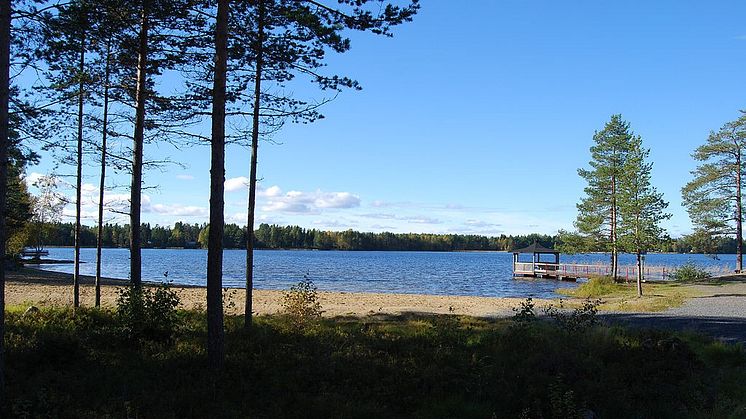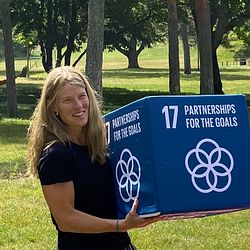
Blogginlägg -
Five ingredients for innovative academic conferences that can contribute to the Sustainable Development Goals
Author: Ana-Maria Vargas, Research director ICLD and responsible for the Local Democracy Academy in Umeå 10-14th of June
"One year ago, a group of seven recognized researchers in the field of local democracy met in Stockholm to discuss how to organize a conference to discuss the role of local governments to meet the Sustainable Development Goals. These senior researchers were divided in two groups and using a “Shark Tank” exercise, they competed to come up with the most innovative idea about how to achieve this. One year later, the organization that called the group of researchers is happy to announce that this conference will take place during the second week of June in the city of Umeå, Sweden. A total of fifty-nine junior and senior scholars from thirty countries, will meet for an entire week at the Local Democracy Academy organized by the Swedish International Centre for Local Democracy (ICLD).
I’d like to share the five key ingredients for innovative academic conferences to contribute to the SDGs based on our upcoming conference:
1. Keep it small and fun
“ Make this conference fun and in a retreat environment” said Jesse Ribot, professor at the American University in Washington. Having attended many academic conferences I feel that the bigger the conference, the more difficult it is to really engage and feel part of it. One feels lucky to be able to have a relevant conversation lasting more than two minutes. In our Academy, we will have forty-six laureates and thirteen mentors. They are divided into six thematic streams about democracy from below, climate action, rebel and inclusive cities, youth and children inclusion, and peace building. The groups in the streams will meet at least three times during the conference for writing workshops, presentations and a world café about further research. In addition to this, the conference will have many “get to know each other” games and we will even organize a BBQ by the lake where everyone is expected to help.
2. Avoid big keynotes and provide space for new talents
“This should be a meeting away from talking heads”, said Merilee Grindle, Professor Emerita, John F. Kennedy School of Government, Harvard University, USA. By this, Merilee means avoid having many keynotes and plenaries and instead provide a space for junior researchers to present their work in progress. To do this, we will have sessions where the laureates will choose among themselves who will be the keynote speakers at the conference. In this way we hope to open a space for talented researchers to share their work. In addition, we will record their presentations and share them in our social media. We will still have some inspiring lectures by the most senior researchers but their main role in the academy is to provide feedback and mentorship to the participants.
3. Use engaging methods to include politicians and practitioners
“During our last ICLD conference politicians and practitioners did not interact so much with the researchers, there was a feeling that their role was to listen to the academic”, said Shabbir Cheema, Senior Fellow at Harvard Kennedy School’s Ash Center for Democratic Governance and Innovation, USA. This time we are simulating a policy lab to discuss challenges experienced by local governments using inspirational cases. Researchers and practitioners will be sharing their knowledge and experiences in guided discussions over two days. The result should be policy recommendations that are innovative and can inspire change.
4. Participants should actively learn not only present
“When I participated at the last World Urban Forum, what I enjoyed the most was the possibility to learn something new”, said Monica Månsson, a civil servant from Malmö Municipality. As researchers we are used to teaching others, but sometimes we miss the opportunity to learn new things. It’s easy to get caught up in your own stuff all the time and the possibility to push your own boundaries gets narrower the longer you are in academia. For this reason, we will have four training sessions at the Local Democracy Academy in Umeå. There will be a session on participatory video as a tool of research and community engagement, a session on knowledge co-production, one on localizing the SDGs and one on writing research applications. We hope to inspire academics to keep learning even if they are senior researchers.
5. Co-create: make something together
From my personal experience, I believe that there is no better way to feel a part of a group than to be able to create something together. The entire Academy is built in a way that participants take an active role and contribute to the results. They must give feedback to each other, help in the social events, and be part of the policy labs to co-create policy recommendations. Furthermore, during the last day, participants are expected to come up with ideas for further research that can contribute to the Sustainable Development Goals from the perspective of local governments.
I believe that academic conferences should be spaces where researchers are challenged and asked to contribute to a better world. As research director of ICLD, my hope is that, in the Local Democracy Academy we will inspire the researchers to get back to their thirty countries of origin and work for changes.
Ana-Maria Vargas, Reserach Director, ICLD
